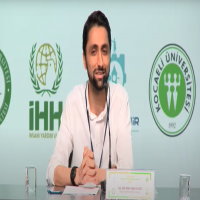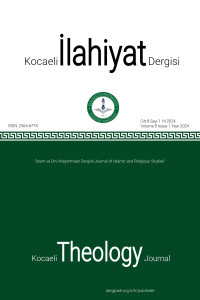Research Article
Aim & Scope
Broadcast Content
Kocaeli Theology Journal contains original scientific publications. All published articles, except editorials, are subject to a double blind peer review process.
Purpose and Scope
The aim of the journal is to contribute to science by publishing high quality publications of scientific importance. For this purpose, it aims to present qualified and original studies in the field of theology to the attention of academic circles and to support the production and dissemination of academic knowledge. In this context, it is aimed to evaluate the existing knowledge accumulated in the field of theological sciences, to improve it by revising it when necessary, to produce new and original ideas, and to publish original research articles, reviews, book reviews in all fields related to the field of theology.
Kocaeli Theology Journal is an independent, double-blind peer-reviewed, open access and online journal that aims to publish articles in the fields of theology, especially Islamic sciences. Articles should describe original data that have not been previously published or submitted for publication elsewhere. Manuscripts that are deemed suitable for the submission rules Kocaeli Theology Journal and the scope of the journal are sent to at least two referees who are experts in their fields for scientific evaluation. The members of the Editorial Board of the Kocaeli Theology Journal then take into account the referees' comments on each submission. The final decision for all submitted manuscripts belongs to the Editor-in-Chief.
Subject Category: Social Sciences and Humanities
Field of Science The Basic Field of Theology
Keywords:
Tafsir, Hadith, Theology, Islamic Law, Sufism, Qiraat, Arabic Language and Rhetoric / Literature, Islamic Philosophy, Philosophy of Religion, History of Philosophy, Logic, History of Religions, History of Islam, History of Islamic Sects, History of Art, Turkish-Islamic Literature, Psychology of Religion, Sociology of Religion, Religious Education, Religious Music
Publication Language
Full Text Publication Language:
• Primary Language: Turkish
• Secondary Language: English
• Third Language: Arabic
Content Written in English and Latin Alphabet:
• Article Title: Turkish & English
• Author Name: Turkish (in Latin Alphabet)
• Author Address: Turkish (in Latin Alphabet)
• Keywords: Turkish & English
• Bibliography: Turkish (in Latin alphabet)
• Full Text Turkish & English
Content Written in Arabic Alphabet:
• Article Title: Arabic & Turkish & English
• Author Name: In Latin Alphabet
• Author Address: Turkish (in Latin Alphabet)
• Keywords: Turkish & English & Arabic
• Bibliography: Arabic & Latin Alphabet
Article Submissions
Submitted manuscripts must be appropriate to the purpose and scope of the journal. Original, unpublished manuscripts that are not in the evaluation process in another journal and whose content and submission have been approved by each author are accepted for evaluation.
Readership
The target audience of Kocaeli Theology Journal is academicians, experts, researchers, undergraduate, graduate and doctoral students interested in social, humanities and religious sciences.
Fee Policy
The publication of articles in the journal and the execution of article processes are not subject to any fee. No processing fee or submission fee is charged under any name for articles submitted to the journal or accepted for publication Kocaeli Theology Journal also does not accept sponsorship and advertisement in accordance with its publication policies. All expenses of Kocaeli Theology Journal are covered by the Dean's Office of Kocaeli University Faculty of Theology.
Copyright
The copyrights of the works published in Kocaeli Theology Journal belong to their authors. Authors give permission for the intellectual work they submit to be published by Kocaeli Theology Journal under the Creative Commons Attribution-NonCommercial 4.0 International (CC BY-NC 4.0) licence.
Originality of Articles
Kocaeli Theology Journal does not accept papers previously published elsewhere. However, published articles in a foreign language may sometimes be accepted.
Author Guidelines
Article Preparation
Language: Turkish, English and ArabicThe language of the journal is Turkish, English and Arabic. English and Arabic articles do not exceed 1/3 of the total number of articles in the journal.
Article Types: Research article, review article, translation article, research note, testimonial, meeting summary, book review,
However, we advise the authors to make the work as concise as possible for dissemination.
Article Format: Word
Image Format: Jpeg
Citation Style: Isnad footnoted. See. https://www.isnadsistemi.org/en/guide/isnad2-2/isnad-author-title-system/
Author Change: Only processed before the manuscript is accepted. Authors are required to carefully review the list and order of authors before submitting their manuscript and provide the final author list at the time of original submission.
Writing Guidelines:
The article template installed in the system should be used for article writing. Sample template: https://dergipark.org.tr/tr/download/journal-file/29731
1. The text of the article should be in Gentium Plus font in 10.5 pt.
2. Short abstracts in Turkish and English should be in Gentium Plus font, 9.5 pt.
3. Footnotes should be in Gentium Plus font in 8 pt.
4. Footnotes and bibliography should be organized according to ISNAD citation system.
5. Persons, places, works and terms used in the article should be based on the TDV Encyclopedia of Islam. The editor has the right to make minor changes in the spelling of the articles. Spelling should be consistent in the spelling of capped and transcribed words.
6. Articles written in Arabic must include short abstracts in Turkish and English.
7. In articles written in Arabic, the bibliography must also be written in Latin alphabet.
8. The font for articles written in Arabic is Scheherazade New.
9. Short abstracts in Turkish, English and Arabic must be at least 200 words.
10. All abstracts should contain at least five (5) keywords. ISNAD guidelines should be applied in the selection of keywords. https://www.isnadsistemi.org/en/guide/isnad2-2/academic-writing/5-keywords/
11. The original title and bibliographic information of a translated article should be indicated in the text.
12. If an article is derived from a thesis or symposium, this should be indicated as a matter of publication ethics. https://www.isnadsistemi.org/en/guide/isnad2-2/academic-writing/1-publication-ethics/1-2-statement-of-publication-ethics/
13. 14. Kocaeli Theology Journal is published twice a year in June and December. The article submission deadline for the December issue is November 15 and for the June issue is May 15. Depending on the intensity of article submissions, the journal may close the article submission earlier.
14. The scholarly, intellectual and literary responsibility of the published articles belongs to the authors.
Source Display Style
Articles should be prepared according to the ISNAD Citation System.
Final Checklist
It is hoped that this list will be useful during the final check of the manuscript before it is uploaded to the journal system.
Make sure that the following items are present:
1. Author information added.
- E-mail address
- Full mailing address
- Phone number
2. All necessary files have been uploaded.
- Article text
Kocaeli Journal of Theology Conflict of Interest Statement / Competing Interests. In order to be published in the article, researchers should include a statement of contribution rate, a statement of support and acknowledgment, if any, and a conflict statement.
3. The article has been "spell checked" and "grammar checked".
4. All references mentioned in the bibliography are cited in the text and vice versa.
Submit Article
The corresponding author account of the corresponding author should be used in the submissions. All correspondence regarding the application is sent to the corresponding author via e-mail sent through the journal system.
When uploading the manuscript file, make sure that this file does not contain any elements that will decipher the identity of the author due to the double-blind review process.
Files You Need to Upload Separately:
1) Full Article Text
2) Conflict of interest declaration for multi-authored articles
3) Home page with author information
Author's Guide
Duties and Responsibilities of AuthorsAuthorship and Contribution
Authorship should be limited to those who made significant contributions to the conception, design, conduct or interpretation of the study. All significant contributors should be listed as co-authors. If there were minor contributors to the study, e.g. language editing, they should be acknowledged in the acknowledgments section. The corresponding author should ensure that all co-authors have seen and approved the final version of the manuscript and agree to its submission for publication. Authors are expected to carefully review the list and order of authors before submitting their manuscript and to provide the final author list at the time of original submission. Only in exceptional circumstances will the editor consider the addition, deletion or rearrangement of authors after the manuscript has been submitted. All authors must agree to any such addition, deletion or reorganization. Authors take joint responsibility for the work.
Author Change Requests
Addition, deletion or rearrangement of author names in the author list can only be made before the manuscript is accepted and only if approved by the Editor of the journal.
If such a change is requested, the Editor will request from the responsible author (a) the reason for the change in the author list and (b) written confirmation (e-mail) from all authors that they agree to the addition. Only in exceptional cases will the Editor consider the addition, deletion or reorganization of authors after the article has been accepted.
Article Writing
Authors of original research papers should address the topic in an original way and with an objective discussion. The paper should include sufficient detail and references to allow others to replicate the work. Fraudulent or knowingly false statements constitute unethical behavior and are unacceptable.
Originality
The author must ensure that the article is original, has not been previously published elsewhere, and is not under consideration for publication elsewhere, in another language.
Using Original Sources and Citation
Authors should ensure that they are writing entirely original work and, if they have used the work or words of others, that it is properly cited. Privately obtained information, such as in conversations, correspondence or discussions with third parties, should not be used without the express written permission of the source.
Data Access and Preservation
Authors may be asked to provide research data supporting their articles for editorial review and/or to comply with the journal's open data requirements. Authors should be prepared to provide public access to such data, if possible, and to retain such data for a reasonable period after publication. The journal recommends uploading research data to TUBITAK's Aperta Portal.
Multiple and Simultaneous Broadcasting
An author should not publish the same research article in more than one journal. It is unethical to submit the same article to more than one journal at the same time. An author should not submit a previously published article for consideration in another journal, except in the form of an abstract.
Publication of Studies Based on Surveys and Interviews
For research in all disciplines that require ethics committee approval (ethics committee approval must be obtained, this approval must be stated and documented in the article. In researches requiring ethics committee approval, information about the approval (name of the committee, date and number) should be included in the method section, as well as on one of the first/last pages of the article; in case reports, information on the signing of the informed consent form should be included in the article.
Conflict of Interest
Any financial or other interest that may cause the person to be conflicted in his/her work, significantly impair his/her objectivity, or provide an unfair advantage in favor of any person or organization. All sources of financial support received during the conduct of the research and preparation of the manuscript and the role of sponsors in the study should be disclosed. If there is no source of funding, this should also be indicated. Examples of potential conflicts of interest that should be disclosed include consultancies, salaries, grants. Potential conflicts of interest should be disclosed at the earliest possible stage.
Error Reporting
When an author discovers a significant error or inaccuracy in his/her published work, he/she should notify the journal immediately. It is also the author's obligation to cooperate in withdrawing or correcting the manuscript if deemed necessary by the editor. If the editor or publisher learns from a third party that a published work contains errors, it is the author's obligation to cooperate with the editor, including informing the editor.
Image Integrity
It is not acceptable to enhance, darken, move, remove or add a specific feature in an image. Authors must adhere to the policy for graphic images implemented by the journal
Ethical Principles and Publication Policy
Publication Ethics Principles
Publication Ethics can be defined as a self-regulatory mechanism that insists on integrity on behalf of authors, reviewers and publishers to establish higher standards of editorial processing. Ethical standards for publication exist to ensure high-quality scientific publications, public confidence in scientific findings, and respect for people's opinions.
• Honest researchers do not plagiarise.
• They do not misattribute sources.
• They do not hide objections they cannot refute.
• They do not distort opposing views.
• They do not destroy or hide data.
Peer-reviewed studies are studies that support and actualize the scientific method. At this point, it is of great importance that all parties involved in the publication process (authors, readers and researchers, publisher, referees and editors) comply with ethical principles. Kocaeli Journal of Theology adheres to national and international standards in research and publication ethics. It complies with the Press Law, the Law on Intellectual and Artistic Works, and the Directive on Scientific Research and Publication Ethics of Higher Education Institutions. Kocaeli Journal of Theology has adopted the International Ethical Publishing Principles published by the Committee on Publication Ethics (COPE), Directory of Open Access Journals (DOAJ), Open Access Scholarly Publishers Association (OASPA). It is also committed to abide by the decisions of the Turkish Editors' Workshop.
• Press Law (National Legislation)
• Law on Intellectual and Artistic Works (National Legislation)
• Higher Education Institutions Scientific Research and Publication Ethics Directive (National Legislation)
• Transparency and Best Practice Principles in Academic Publishing (International Criteria)
• Turkey Editors' Workshop Decisions (National Criteria)
Replay
Republishing is the publication of the same article or substantially similar articles in more than one journal. The editor sends back such an article without reviewing it. The editor may then impose an embargo for a certain period of time on the author attempting to republish, announce this in the journal in which the author has previously published (perhaps simultaneously with the editor of the journal that published the previous article), or all of these measures together.
Simultaneous submission of the same work to more than one journal
Authors may not submit the same article to more than one journal at the same time. If the editor learns of the possibility of simultaneous submission, he/she reserves the right to consult with the other editor(s) receiving the manuscript. In addition, the editor may return the manuscript without review or reject the manuscript without considering the reviews, or may take this decision in consultation with the other editor(s) involved and decide not to accept submissions from authors for a certain period of time. He/she may also write to the authors' employers or take all of these measures together.
Suicide Prevention Control
Plagiarism is presenting the ideas, methods, data, practices, writings, forms or works of others as one's own work in whole or in part without citing the authors in accordance with scientific rules.
Kocaeli Theology Journal screens all submitted articles to prevent plagiarism. The studies submitted for review are checked for plagiarism using Turnitin & Ithenticate software. The similarity rate is expected to be less than 20%. The main measure of similarity is the author's compliance with the rules of citation and citation. If the similarity rate is 1%, but citation and quotation are not done properly, plagiarism may still be in question. In this respect, citation and quotation rules should be known and carefully applied by the author: ISNAD
Plagiarism, duplication, pseudo-authorship/ denied authorship, research/data fabrication, article slicing, sliced publication, copyright infringement and concealment of conflict of interest are considered unethical behaviours. All articles that do not comply with accepted ethical standards are removed from publication. This includes articles containing possible irregularities and non-conformities detected after publication.
Forgery
To produce data that is not based on research, to edit or change the work presented or published on the basis of unreal data, to report or publish them, to show a research that has not been done as if it has been done.
Falsifying research records and data obtained, showing methods, devices and materials that were not used in the research as if they were used, not evaluating data that do not comply with the research hypothesis, manipulating data and/or results to fit the relevant theory or assumptions, falsifying or shaping the results of the research in line with the interests of the persons and organisations supported.
Protection of Personal Data of Participants
Kocaeli Theology Journal requires that all research involving personal or sensitive data or materials relating to human participants that are not legally available to the public be subject to formal ethical review.
Addressing Allegations of Research Misconduct
Kocaeli Theology Journal adheres to COPE's Ethical Toolkit for a Successful Editorial. The editors of Kocaeli Theology Journal will take measures to prevent the publication of articles in which plagiarism, citation manipulation, data falsification, data fabrication, and other research misconduct occur. In no case will the editors of Kocaeli Theology Journal knowingly allow such misconduct to occur. In the event that the editors of Kocaeli Theology Journal become aware of any allegations of research misconduct related to an article published in their journal, they will follow COPE's guidelines regarding allegations.
Ethical Violation Notifications
If readers notice a significant error or inaccuracy in an article published in Kocaeli Theology Journal or have any complaints about the editorial content (plagiarism, duplicate articles, etc.), they can send an e-mail to kider@kocaeli.edu.tr. We welcome applications as it will provide an opportunity for us to improve, and we will respond quickly and constructively.
Correction, Retraction, Expression of Concern
Editors may consider publishing a correction if minor errors are detected in the published article that do not affect the findings, interpretations and conclusions. Editors should consider retracting the manuscript if there are major errors/violations that invalidate the findings and conclusions. Editors should consider issuing a statement of concern if there is a possibility of research or publication misconduct by the authors; if there is evidence that the findings are unreliable and the authors' institutions have not investigated the incident; or if the possible investigation seems unfair or inconclusive. COPE guidelines regarding correction, retraction or expression of concern are taken into account.
Publication of Studies Based on Surveys and Interviews
Kocaeli Theology Journal adopts the "Code of Conduct and Best Practice Guidelines for Journal Editors" and "Code of Conduct for Journal Publishers" principles of the Committee on Publication Ethics (COPE) in order to provide ethical assurance in scientific periodical publishing. In this context, the following points should be complied with in the studies submitted to the journal:
1) For research in all disciplines that require ethics committee approval (ethics committee approval must be obtained, this approval must be stated and documented in the article.
2) In studies requiring ethics committee authorisation, information about the authorisation (name of the committee, date and number) should be included in the method section and on one of the first/last pages of the article; in case reports, information on the signature of the informed consent form should be included in the article.
Special Issue Publication Policy
A special issue can be published once a year upon the request of the Editorial Board. Articles submitted for inclusion in the special issue are first subjected to a preliminary editorial review. Then, they are examined for compliance with the journal's spelling rules and similarity screening is performed to prevent plagiarism. After these stages, they are included in the peer review process using the double-blinding model.
Editorial Confidentiality Obligation
The editors of Kocaeli Theology Journal treat all submitted manuscripts as confidential documents, which means that they will not disclose information about a manuscript to anyone without the authors' permission. During the manuscript review process, the following people have access to the manuscripts: Editors, Referees, Editorial Board Members. The only situation where details about a manuscript may be passed to a third party without the authors' permission is if the editor suspects serious research misconduct.
Allegations-Suspicions of Scientific Misconduct
There are different definitions of scientific misconduct. We address these issues on a case-by-case basis as the Kocaeli Theology Journal follows the guidance established by major publication ethics bodies. If the editor suspects or alleges an ethical violation, they are obliged to take action. This duty extends to both published and unpublished articles. The editor should not simply reject articles raising concerns about possible misconduct. He/she is ethically obliged to follow up on alleged cases. The editor should follow COPE flowcharts when appropriate. Editors should first seek a response from those suspected of misconduct. If they are not satisfied with the response, they should ask the relevant employer or organisation to investigate. The editor should make all reasonable endeavours to ensure that an appropriate investigation into the alleged misconduct is carried out; if this fails, the editor should make all reasonable attempts to insist on a resolution to the problem. This is an arduous but important task.
Kocaeli Theology Journal adheres to COPE's Ethical Toolkit for a Successful Editorial. The editors of Kocaeli Theology Journal will take measures to prevent the publication of manuscripts in which plagiarism, citation manipulation, data falsification, data fabrication, and other research misconduct occur. In no case will Kocaeli Theology Journal or its editors knowingly allow such misconduct to occur. If the editors of Kocaeli Theology Journal become aware of any allegations of research misconduct related to an article published in their journal, they will follow COPE's guidelines regarding allegations.
Reviewers should inform the Editor if they suspect research or publication misconduct. The Editor is responsible for taking necessary action in accordance with COPE recommendations.
Kocaeli Theology Journal is committed to following the COPE flowcharts when faced with allegations of misconduct in the following or similar matters.
• What to do if a rebroadcast is suspected
• What to do when plagiarism is suspected
• What to do if fabricated data is suspected
• What to do when requesting a change of authorship
• What to do if an undisclosed conflict of interest is suspected
• What to do if unfair or gift authorship is suspected
• What to do when an ethical problem is suspected in an article
• What to do when the suspicion of ethical violation is directly notified by e-mail, etc.
• What to do when a suspected ethical violation is announced via social media
Complaint Procedure
This procedure applies to complaints about content, procedures, or policies that are the responsibility of Kocaeli Theology Journal or our editorial staff. Complaints can provide an opportunity and incentive for improvement and we aim to respond quickly, courteously and constructively.
The complaint must relate to content, procedures or policies that are the responsibility of Kocaeli Theology Journal or our editorial team. Complaints should be emailed directly to kider@kocaeli.edu.tr and will be treated confidentially. The editor responds to complaints immediately. The editor follows the procedure outlined in the COPE flowchart regarding complaints.
Complaints are reviewed by the relevant member of the editorial team and, if not resolved, the following processes are followed:
• If this initial response is considered inadequate, the complainant may request that the complaint be forwarded to a more senior member of the journal.
• If the complainant is not satisfied, the complaint may be forwarded to the editor-in-chief.
• If possible, a full response will be given within two weeks.
COPE publishes a code of practice for editors of scientific journals. This should facilitate the resolution of disputes with editors, journals and publishers, but only after the journal's own complaints procedures have been exhausted.
Appeal Process
We welcome serious objections to the evaluations made by editors and reviewers. If you feel that we have rejected your paper because we misunderstood its scientific content, please send an appeal message to our editorial team at kider@kocaeli.edu.tr. Do not attempt to submit a revised version of your manuscript at this stage. If, after reading your appeal letter, we realise that your appeal is justified, we may invite you to submit a revised version of your manuscript. Your manuscript will then be resubmitted to the external reviewer process. Please include as much detail as possible in the appeal letter. Finally, we can only consider one appeal per manuscript, so please take the time and effort to write the letter in detail to make your appeal clear - you have one chance, so use it well. We have found that prolonged deliberation over rejected papers is often unsatisfactory for both authors and editors, so we do not process multiple appeals for the same paper.
Conflicts of Interest
A conflict of interest arises when professional judgement about a primary interest may be influenced by a secondary interest (such as financial gain or personal competition). We believe that we need to know the authors' conflicting interests in order to make the best judgement about how to handle an article, and that readers need to know them if we publish the article.
Any interest, financial or otherwise, that may cause the person to be conflicted in his or her work, significantly impair his or her objectivity, or provide an unfair advantage in favour of any person or organisation. All sources of financial support received during the conduct of the research and preparation of the manuscript and the role of sponsors in the study should be disclosed. If there is no source of funding, this should also be indicated. Examples of potential conflicts of interest that should be disclosed include consultancies, salaries, grants. Potential conflicts of interest should be disclosed at the earliest possible stage.
Kocaeli Theology Journal has a specific process to ensure that submissions from editors, staff or editorial board members are evaluated impartially. Such submissions are first referred to other journals. If this is not possible, the applicant is suspended from the journal. These submissions are reviewed in a double-blind process.
The editor should not be involved in decisions about manuscripts written by him/herself or by family members. Furthermore, such a paper should be subject to all the usual procedures of the journal. The editor should follow the COPE guidelines on disclosure of potential conflicts of interest by authors and reviewers.
Research Ethics Principles
Kocaeli Theology Journal adheres to the highest standards of research ethics and embraces the internationally defined research ethics principles outlined below. The adherence of articles to ethical rules is the responsibility of the authors.
• Integrity, quality, and transparency principles should be ensured in the design, review, and execution of the research.
• The research team and participants should be fully informed about the purpose of the research, its methods, anticipated potential uses, requirements for participation, and, if any, the risks involved.
• Confidentiality of information provided by research participants and the privacy of respondents should be ensured. Research should be designed to safeguard the autonomy and dignity of research participants.
• Research participants should voluntarily take part in the study and should not be under any coercion.
• Participants should be prevented from being harmed. Research should be planned in a way that does not put participants at risk.
• Transparency regarding research independence should be maintained; conflicts of interest should be disclosed if present. • In experimental studies involving human subjects, written informed consent must be obtained from participants deciding to participate in the research. Approval from the legal guardian should be obtained for children, wards, or individuals with certified mental illness.
• If the study is to be conducted in any institution or organization, approval should be obtained from that institution or organization.
• In studies involving human subjects, the "methods" section should indicate that "informed consent" was obtained from the participants and that ethical approval was obtained from the institution where the study was conducted.
Price Policy
The publication of articles in the journal and the execution of article processes are not subject to any fee. No processing fee or submission fee is charged under any name for articles submitted to the journal or accepted for publication. Kocaeli Journal of Theology does not accept sponsorship and advertisement in accordance with its publication policies. All expenses of Kocaeli Journal of Theology are covered by the Dean's Office of Kocaeli University.
Indexes
Journal Boards
Proprietor

1964 Bayburt doğumlu, Marmara İlahiyat ve Sosyal bilimler mezunu.
Responsible Manager

Editor-in-Chief

Assoc. Prof. Dr. Hüseyin Okur Editor-in-Chief of Kocaeli Journal of Theology Kocaeli University Faculty of Theology, Department of Islamic Law huseyin.okur@kocaeli.edu.tr 0505 233 94 64
Assistant Editors


Field Editors



Editorial Board





Assoc. Prof. Dr. Ali Cançelik is a faculty member at Kocaeli University, Faculty of Theology, Department of Islamic History and Arts, where he teaches Ottoman Turkish and Islamic Turkish Literature. He completed his BA, MA, and PhD at Istanbul University in the field of Turkish Language and Literature. His doctoral dissertation examined sixteenth-century Ottoman divan poetry as a historical source.
His academic research focuses on classical Turkish literature, Sufi and mystical poetry, the relationship between divan poetry and music, urban and civilizational thought, and Ottoman intellectual and cultural history. He has published extensively on Sufi poets such as Niyâzî-i Mısrî, Nâbî, Yunus Emre, Nesîmî, and Şeyh Gâlib, with particular attention to mystical aesthetics, cosmology, and symbolism in poetry. He has served as principal investigator and advisor in numerous national and international research projects, including studies on manuscript collections, lyric anthologies, and textual analysis.
Assoc. Prof. Dr. Cançelik’s work adopts an interdisciplinary approach that brings together literature, mysticism, and intellectual history, and he continues to contribute to comparative studies on the mystical and cosmological dimensions of classical poetic traditions.

English Language Editor

Arabic Language Editor

Arabic Language Editor


Advisory Board
Prof. Dr. Abdullah Kahraman, Kocaeli Üniversitesi İlahiyat Fakültesi, Kocaeli/TÜRKİYE
Prof. Dr. Abdurrahman Özdemir, İstanbul Üniversitesi İlahiyat Fakültesi, İstanbul/TÜRKİYE
Prof. Dr. Ali İhsan Pala, Atatürk Üniversitesi İlahiyat Fakültesi, Erzurum/TÜRKİYE
Prof. Dr. Bayram Ali Çetinkaya, İstanbul Üniversitesi İslami İlimler Fakültesi, İstanbul/TÜRKİYE
Prof. Dr. H. Mehmet Günay, Sakarya Üniversitesi İlahiyat Fakültesi, Sakarya/TÜRKİYE
Prof. Dr. Halil İbrahim Şimşek, Hitit Üniversitesi İlahiyat Fakültesi, Çorum/TÜRKİYE
Prof. Dr. Hülya Alper, Marmara Üniversitesi İlahiyat Fakültesi, İstanbul/TÜRKİYE
Prof. Dr. İsmail Çalışkan, Yıldırım Beyazıt Üniversitesi İlahiyat Fakültesi, Ankara/TÜRKİYE
Prof. Dr. Kemal Yıldız, Marmara Üniversitesi İlahiyat Fakültesi, İstanbul/TÜRKİYE
Prof. Dr. Metin Özdemir, Yıldırım Beyazıt Üniversitesi İslami İlimler Fakültesi, Ankara/TÜRKİYE
Prof. Dr. Şevket Topal, Recep Tayyip Erdoğan Üniversitesi İlahiyat Fakültesi, Rize/TÜRKİYE
Prof. Dr. Ünal Kılıç, Cumhuriyet Üniversitesi İlahiyat Fakültesi, Sivas/TÜRKİYE
Doç. Dr. Ali Avcu, Cumhuriyet Üniversitesi İlahiyat Fakültesi, Sivas/TÜRKİYE
Doç. Dr. Ali Namlı, Marmara Üniversitesi İlahiyat Fakültesi, İstanbul/TÜRKİYE
Doç. Dr. Ömer Aslan, Cumhuriyet Üniversitesi İlahiyat Fakültesi, Sivas/TÜRKİYE
Doç. Dr. Süleyman Kaya, Sakarya Üniversitesi İlahiyat Fakültesi, Sakarya/TÜRKİYE
Doç. Dr. Yakup Coştu, Hitit Üniversitesi İlahiyat Fakültesi, Çorum/TÜRKİYE
Dr. Öğr. Üyesi Adalet Çakır, Kocaeli Üniversitesi İlahiyat Fakültesi, Kocaeli/TÜRKİYE

Auto-generated board - Please Edit This Title






Marmara Üniversitesi İlahiyat Fakültesi (2003) ve İktisat Fakültesi Kamu Yönetimi’nden (2013) mezun oldu. Yüksek lisans (2008) ve doktora (2015) eğitimini Marmara Üniversitesi İlahiyat Fakültesi’nde nihayete erdirdi. Çalışma alanları arasında; dünya tarihi ve yazıcılığı, İslam medeniyeti tarihi, İslam tarihi yazıcılığı ve felsefesi, Özbekler, çağdaş İslam düşüncesi gibi konular bulunmaktadır. Macit'in, Şeybânî Özbek Hanlığı, Ahterî Muslihiddin Mustafa Efendi, Önden Gidenler: Necmettin Erbakan (Boşnakça ve Arnavutça tercüme), Çağa İz Bırakan Önderler: Mehmed Akif Ersoy ve Necmettin Erbakan, Muhammed Hamidullah Modern Bir İslam Alimin İlmi Portresi, İslam Tarihçiliğinin Zirve İsmi Muhammed Hamidullah, Bir Müslüman İslam’da Yönetim Biçimi ve Halifelik’e Nasıl Bakmalı?, Geçmişten Günümüze Hilafet (ed.), Tüm Yönleriyle Hz. Peygamber ve Ahlakı (ed.), Salgın Günlerinde Toplumu ve Siyaseti Yeniden Düşünmek (ed.), Devletlerimiz Şeybânîler, İran’da Tarih Kaynakları ve Tarihyazımı (ed.), Mısır’da Tarih Kaynakları ve Tarihyazımı (ed.), Balkanlarda Tarih Kaynakları ve Tarihyazımı (ed.) ve Hint Alt Kıtası’nda Tarih Kaynakları ve Tarihyazımı (ed.), serlevhalı kitapları, Muhammed Hamidullah: İslam İktisadının Öncü İsmi adlı çeviri ve ulusal ve uluslararası düzeyde çok sayıda kitap ve dergilerde yayınlanmış makaleleri vardır. 2020-2023 yılları arasında İlmi Etüdler Merkezi’nde (İLEM) başkanlık yapmıştır. Hâlihazırda Kocaeli Üniversitesi İlahiyat Fakültesi’nde Siyer-i Nebi ve İslam Tarihi alanında öğretim üyesi olarak çalışmaktadır.

Assoc. Prof. Dr. Hüseyin Okur Editor-in-Chief of Kocaeli Journal of Theology Kocaeli University Faculty of Theology, Department of Islamic Law huseyin.okur@kocaeli.edu.tr 0505 233 94 64














